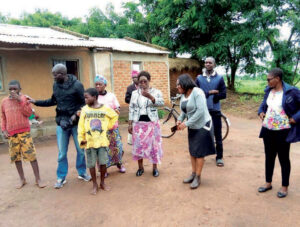By Andrew Mkonda:
It has been hell on earth for Major Lyton and Yamikani Dyless.
Sleeping on an empty stomach and going from one place to another in search of piecework to find food, clothing and school materials on their own has been a part of their lives.
This is what has been characterising lives of Lyton, 11, and Dyless, 13, born from different poor fathers in Traditional Authority (TA) Chitekwere in Lilongwe District.
“Since our mother [Teresa Alick, aged 30] got married to another man, our lives have never been the same. My four siblings and I lack a lot of things in our lives, and this has even caused us to stop going to school.
“We do almost everything on our own as our stepfather also depends on piecework for us to eat. We herd cattle and goats and work in farms just for our survival,” Yamikani says, tears welling up in his eyes.
The siblings recently covered about 80 kilometres, from TA Chitekwele to TA Chadza in search of piecework.
“We left our home and went to the area of TA Chadza where we were employed to herd cattle. It was not easy because, in most cases, we were herding the cattle in a thick forest barefooted and we were reporting back home very late without eating anything,” Yamikani says.

After learning of this development, Lilongwe District Labour Office and other stakeholders teamed up to withdraw the two boys from herding the cattle, describing it as child labour.
Lilongwe District Labour Officer Chiletso Mbewe has singled out child abandonment and lack of support for the children as some of the factors fuelling child labour in the district.
“It is sad that many families, more especially in rural areas, continue bearing children that they cannot afford to take care of. This forces young children to seek piecework for their daily needs,” Mbewe says.
A 2022 Malawi National Child Labour survey shows that the vice continues to affect an estimated 2.1 million children, aged five to 17, representing a 38 percent of this age group.
These numbers indicate that efforts in this regard need to be intensified and accelerated for the goal of child labour elimination to be reached in the nearest possible future.
The survey also revealed that child labour is higher among children from poor households and even among better-off households, as it shows that more than one in three children are in child labour.
In policy terms, this result suggests that a strategic response based on poverty reduction alone is unlikely to be effective in eliminating child labour.
The statistics further indicate that 72 percent of children, aged five to 17, work in the agriculture sector, 23 percent in the domestic sector and three percent in wholesale.
In urban areas, less than half of those aged between five and 17 work in the agriculture, forestry and fishing industries, 11 percent in wholesale and retail trade, 39 percent in the domestic sector and four percent in other sectors.
Mbewe urges parents and guardians to take care of their children by providing for their needs such as food, clothing and good shelter so that they do not go out and work in hazardous places.
The Child Care, Protection and Justice Act stipulates that parents and guardians must do everything within their potential to provide support and protection to children.
The Act also allows the child, the parent of the child, the guardian of the child, relatives of the child, a social welfare officer, a police officer, a teacher, a health officer and any other appropriate person to apply against such persons to the children’s court for a child maintenance order.
Mbewe says Lilongwe District Council has already formulated by-laws that will deal with all parents and guardians that allow their children to work in hazardous places like estates, mines and factories.
“These children we have repatriated and withdrawn have been working as herd boys at that age. This clearly shows that these children are not taken care of by their parents. It is very pathetic,” she laments.
Gikilosi Phiri, 32, admitted that he was failing to take care of his stepchildren because he was not working and that he did not have a stable business to depend on.
“Even our house doesn’t have a door cover and we sleep like that. It is not deliberate that these young children go out to look for piecework,” Phiri says.
He has appealed to nongovernmental organisations and others to assist the family with essential items such as food, clothing, beddings and cash for starting a small business.
Malawi News Agency also observed that the family does not even have a toilet and a bathroom.
We also observed that there is no child in the family who goes to school due to lack of school materials such as bags, exercise books and pens.
We further noted that although Phiri’s family is passing through such a difficult situation, his wife is expectant again and the number of children in the family will keep rising.
Group Village Head Chinyama in TA Chitekwele thanked the district labour office for withdrawing the boys from herding cattle, saying their future would have been completely destroyed if the office had not intervened.
“It is pathetic to see children like these working in such hard conditions while their friends are at school,” the chief says.—Mana








